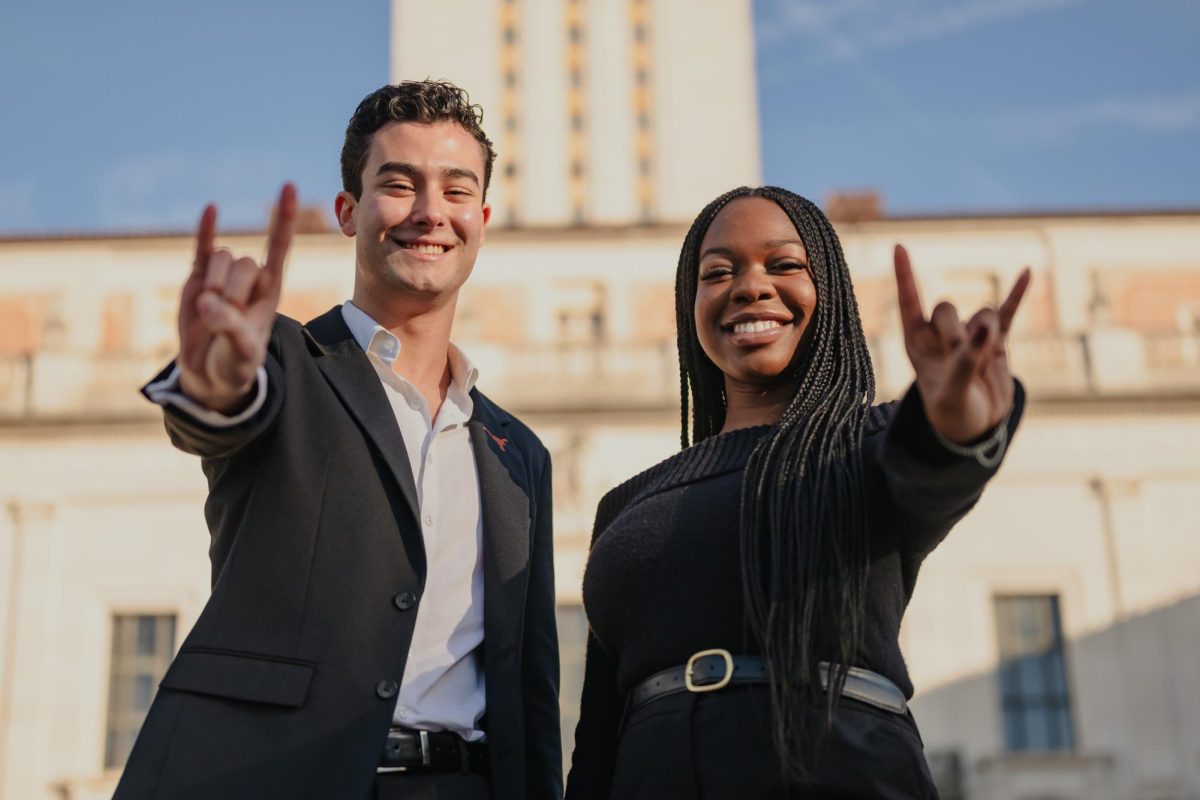Editor’s note: This endorsement reflects the opinion of the Editorial Board and not necessarily the opinions of The Daily Texan staff as a whole.
Student government campaigns often promise big changes on campus, but they stumble when it comes to actualization. Student Government is a bureaucratic institution that is outdated and rarely achieves anything noteworthy, which is why some of the most prominent change-makers on our campus are student organizations and advocacy groups.
Regardless, SG persists in its annual election cycle. This year, six executive alliances campaigned: Grayson Oliver with Elizabeth Tomoloju, JD Romero with Erin McCormick, Jonathan Wilson with Morgan Hernandez, Amy DonJuan with Christopher Zapata, Hudson Thomas with Thierry Chu and Amin Mashhoon with Ava Hosseini.
With the ongoing legislative session and University administration in flux, it’s more necessary now than ever to know the legal framework under which SG operates. However, several alliances lack an understanding of critical legislative developments, including SB 17 and institutional neutrality. This confusion makes several SG candidates ill-equipped to assume the highest leadership roles in the student body.
This Editorial Board is responsible for endorsing one executive alliance, and we made our selection based on which pair we believe will make the most immediate and tangible impact on the UT community. Our assessment is based on interviews we conducted with each alliance, the candidates’ public platforms and performance in this past Monday’s debate.
This Editorial Board recommends you vote for Grayson Oliver and Elizabeth Tomoloju
Grayson Oliver and Elizabeth Tomoloju stand out as the most qualified executive alliance in this election. As the only team in which both candidates have prior SG experience, they understand the system’s constraints and have built relationships with administration, both of which are essential to enact any sort of change.
SG notoriously lacks transparency and accountability. However, Grayson and Elizabeth’s proposal to implement a legislative project tracker for public view is realistic and, importantly, a low-cost solution to a longstanding problem that the University of Southern California has similarly utilized.
Their financial approach hinges on the reallocation of funds. These include a dedicated $10,000 budget line item to support student advocacy groups and the implementation of regular, public budget check-ins. Furthermore, their plans to continue expanding free menstrual product distribution through campus, offer an accessibility map and increase free CMHC sessions reflect a dedication to the well-being of different communities on campus while prioritizing feasibility.
Despite the state’s DEI ban, Oliver and Tomoloju are committed to supporting diversity on campus by connecting students to third-party resources when possible.
This alliance’s promise to redistribute funds to autonomous student organizations, such as West Campus Collective, without bringing those organizations under the SG umbrella will allow these groups to continue their work unhindered by legislative and University restrictions.
Oliver and Tomoloju’s realistic and experience-grounded platform sets their alliance apart as the best choice for the UT community.
Here is how we believe the other alliances fall short:
JD Romero and Erin McCormick
Erin McCormick and JD Romero focus their campaign on immigrant rights and SB 17 issues. Romero has held SG positions, but McCormick has no SG experience.
The alliance makes impossible promises, such as creating a mini-grants program for groups affected by SB 17. Considering SG received almost $3,000 less than requested for the 2024-2025 school year, funding a costly new initiative is unlikely.
McCormick and Romero are passionate about conquering SB 17 issues, but their platform doesn’t reflect a clear solution. Their goals to reinstate cultural graduation ceremonies and to reopen the Multicultural Engagement Center and the Women’s Community Center would be illegal, as they were initially shut down for violating the order.
Their initiative to implement “know your rights” modules for undocumented students at orientation would need to be approved by the UT Board of Regents, which contradicts previous state legislative priorities.
While they may have well-intentioned ideas, Romero and McCormick ultimately fail to demonstrate actionable steps forward.
Jonathan Wilson and Morgan Hernandez
Jonathan Wilson and Morgan Hernandez’s six-tier platform does show promise. Their idea to compile resources in tandem with UT Law for students with various citizenship statuses would provide much-needed support for community members whose rights are threatened. While other alliances promised to increase student outreach, Wilson and Hernandez’s proposal to expand One Texas, an executive board that works with various student organizations to appoint a student representative to the Board of Regents, is one of the only real plans to do so.
While Wilson and Hernandez have reasonable policies and implementation plans, their campaign falls short with budgeting. Their goals to subsidize meal plans, provide Moody and School of Information students with free access to Adobe Premiere and establish stipends for student materials lack a clear path to affordability. Their fallback strategy, to petition the University for more funding or reach out to Texas Exes, is tenuous at best. Additionally, their promise to rally against institutional neutrality is beyond SG’s scope, as this policy is under the Board of Regents’ jurisdiction.
Amy DonJuan and Christopher Zapata
Amy DonJuan and Christopher Zapata are committed to representing first-generation students and underrepresented communities at UT. Nonetheless, their efforts will extend across campus as a whole. Their campaign rests on a five-pillar slogan, “VOICE,” each letter symbolic of vague goals for increased transparency and community building. While this alliance has well-intentioned motivations, its goals are hard to grasp structurally.
DonJuan said she aims to prioritize the student body with frequent, recurring town hall meetings, but SG already hosts weekly town hall meetings open to all students. This alliance aims to implement RecSports credits, even though TeXercise passes are already available. With ambiguous policies, such as aesthetic photo and study spaces across campus, these issues are not the most pressing concerns. Many of their aspirations are community and donor-based, hoping to get funding from alumni and other philanthropic networks. These goals include supplying allowances for students to attain nutrition services and feasible meal plans. Though this is commendable, it is hard to understand the feasibility without thorough financial planning and administration involvement.
Their goals to increase student resilience fall flat on the grounds of an ambiguous plan and simple, nominal policy.
Hudson Thomas and Thierry Chu
Hudson Thomas and Thierry Chu emphasize prioritizing conversations with the student body yet struggle to outline a plan to do so clearly. During our interview, Thomas explained that they want to meet with every SG member individually and open up meeting opportunities with student organizations. With more than 1,000 organizations, it seems this alliance is already biting off more than it can chew. While buzzwords like “town hall” or “civic discourse” sound promising, they fail to articulate a clear and achievable method to make things happen.
Many of their solutions prove unattainable for a variety of reasons. Their goal to add major technological renovations like an app rewarding students for gym visits, improving Hornslink or creating a community service database would all require exorbitant amounts of time and labor. Similarly, another key proposition is to absorb the organizational tasks of the Division of Diversity and Community Engagement after its disbandment. However, this solution again would require manpower and funds not acknowledged in the campaign plan.
They also broke the campus-wide election code in their campaign, with a registered complaint for attempting to present at an organization’s meeting before the election period began. Their lack of consideration for ethical leadership or institutional rules is telling.
Amin Mashhoon and Ava Hosseini
While Amin Mashhoon and Ava Hosseini center their platform around advocacy and activism, their campaign suffers from a lack of legal understanding and SG experience. While both have experience in civil rights, this is not sufficient preparation for SG president and vice president. A desire to reinvest in community initiatives removed after SB 17, while admirable, is against the law. Similarly, their call for the University to “divest from unethical organizations” is an infeasible standard as SG has no direct influence on the University’s financial decisions.
The alliance expressed that, historically, SG has been closed to the public. They seek to draw from their activism roots to uplift the UT community but lack actionable plans and a strong understanding of the University’s policies and processes. Another campaign policy that falls short is a suggestion to designate UT as a “sanctuary campus,” which violates a January directive from the Department of Homeland Security, according to previous Texan coverage.
Ultimately, Mashhoon and Hosseini may struggle to implement their vision. While the alliance boasts strong relationships with its constituents, it lacks a necessary relationship with SG or administration at UT.
Vote
Join us in voting for Grayson Oliver and Elizabeth Tomoloju in the campus-wide elections from 8 a.m. Monday, March 3 and closes at 5 p.m. on Tuesday, March 4.
The editorial board is composed of associate editors Emily Harrison, Tenley Jackson, Tanya Narwekar, Ava Saunders, Anjali Shenoy and editor-in-chief McKenzie Henningsen.




















